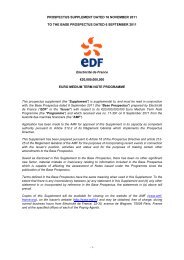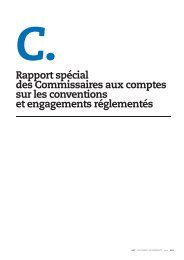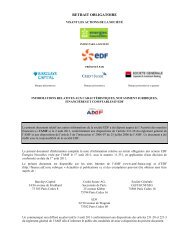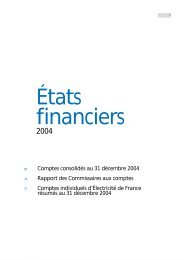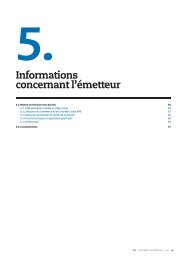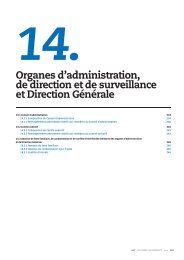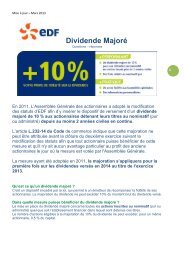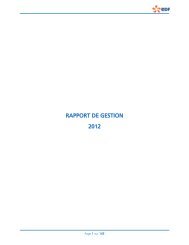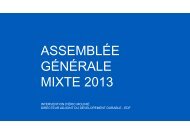Under the Euro Medium Term Note Programme ... - Finance - EDF
Under the Euro Medium Term Note Programme ... - Finance - EDF
Under the Euro Medium Term Note Programme ... - Finance - EDF
Create successful ePaper yourself
Turn your PDF publications into a flip-book with our unique Google optimized e-Paper software.
Risk Factors<br />
Risks associated with <strong>the</strong> <strong>Euro</strong>pean energy markets<br />
The <strong>EDF</strong> Group faces stiff competition in <strong>the</strong> <strong>Euro</strong>pean energy markets and, in<br />
particular, in <strong>the</strong> French electricity market, which is its main market<br />
In France, since 1 July 2007, <strong>the</strong> electricity market has been totally open to competition. All<br />
<strong>EDF</strong> customers may now choose <strong>the</strong>ir electricity supplier and can <strong>the</strong>refore choose any of<br />
<strong>EDF</strong>’s competitors. <strong>EDF</strong> has implemented measures to meet <strong>the</strong> competition, but <strong>the</strong><br />
changing competitive landscape (new regulations, emergence of new players, mergers<br />
between existing players, etc.) could cause <strong>EDF</strong> to lose market share. This loss of market<br />
share could, at constant consumption and price levels, have a negative impact on <strong>the</strong> <strong>EDF</strong><br />
Group’s sales. Lastly, to achieve its objectives, <strong>EDF</strong> could be forced to increase its<br />
marketing expenditures or reduce its margins (especially in <strong>the</strong> event of price competition),<br />
which would have a negative effect on its profitability.<br />
Elsewhere in <strong>Euro</strong>pe, <strong>the</strong> <strong>EDF</strong> Group faces differing contexts, depending on <strong>the</strong> competitive<br />
situation (more or less totally open markets, position of competitors, regulations, etc.).<br />
Therefore, in some countries, or in certain regions within a country, <strong>the</strong> <strong>EDF</strong> Group must<br />
pursue a defensive strategy to protect its market share, as it does in France. On <strong>the</strong> o<strong>the</strong>r<br />
hand, in o<strong>the</strong>r countries, <strong>the</strong> <strong>EDF</strong> Group must pursue an offensive strategy to gain market<br />
share. The type of competition, <strong>the</strong> expansion of such competition and its effect on <strong>the</strong> <strong>EDF</strong><br />
Group’s activities and its results vary from one country to ano<strong>the</strong>r. These factors depend on<br />
<strong>the</strong> degree of deregulation in <strong>the</strong> country in question and on various o<strong>the</strong>r factors over which<br />
<strong>the</strong> <strong>EDF</strong> Group has no control.<br />
Within this context, despite <strong>the</strong> fact that <strong>the</strong> <strong>EDF</strong> Group considers that <strong>the</strong> <strong>Euro</strong>pean<br />
electricity market offers opportunities, <strong>the</strong> <strong>EDF</strong> Group may not be able to defend its market<br />
share or gain expected market shares, or it may see its margins decrease, which would have<br />
a negative effect on its activities, its strategy and its financial results.<br />
The legal framework governing <strong>the</strong> liberalisation of <strong>the</strong> energy sector is recent. This<br />
framework may change in <strong>the</strong> future and become more restrictive<br />
The <strong>EDF</strong> Group’s activities in France and abroad are subject to numerous regulations.<br />
Moreover, laws may vary from one country to ano<strong>the</strong>r, including in <strong>the</strong> <strong>Euro</strong>pean Union<br />
where directives only establish a general framework.<br />
This legal framework organising <strong>the</strong> liberalisation of <strong>the</strong> energy sector is relatively recent and<br />
does not necessarily provide comprehensive solutions to <strong>the</strong> difficulties created by market<br />
liberalisation. The legal framework is <strong>the</strong>refore subject to change, and such changes could<br />
be unfavourable to <strong>the</strong> <strong>EDF</strong> Group. Such future changes to <strong>the</strong> legal framework, whe<strong>the</strong>r in<br />
France or abroad, could lead to additional costs, be inconsistent with <strong>the</strong> <strong>EDF</strong> Group’s<br />
growth model or change <strong>the</strong> competitive context in which <strong>the</strong> <strong>EDF</strong> Group operates.<br />
For example, in <strong>the</strong> United Kingdom, <strong>the</strong> legal framework governing electricity producers’<br />
access to <strong>the</strong> main UK transportation and transmission network was amended in August<br />
2010. The UK regulator (Ofgem) is currently reviewing a draft revision of tariffs for access to<br />
electricity networks that may lead to higher costs for existing generating units and also<br />
impact <strong>the</strong> profitability of all new power plants. This review has been termed Project<br />
TransmiT and Ofgem’s recommendations are expected by spring 2012.<br />
-37 -



